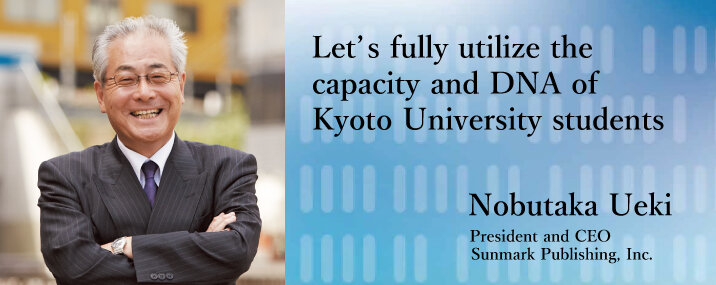Vol.20 Interview with Donors

Nobutaka Ueki
Born in Kyoto in 1951. Graduated from the Faculty of Letters, Kyoto University, in 1976. After working at Choubunsha Publishing Co., Ltd., joined Education Research Co., Ltd., the predecessor of Sunmark Publishing, Inc. in 1978. Planned and edited major hits, including Shigeo Haruyama's A Great Revolution in the Brain World (4.1 million copies), which became the number two (at the time) postwar blockbuster. In current position since 2002.
Q Please tell us some memories from your days at Kyoto University.
My father and two older brothers were accepted to Kyoto University on their first try, so I was under pressure, but my first attempt to be accepted to the Faculty of Science failed. While I prepared for the next year, I read books by Nietzsche and Schopenhauer and fell in love with philosophy. The following year, I changed faculties but failed again, and I finally made it into the Faculty of Letters after two years of extra preparations. However, there were a lot of philosophical students who would spend all day reading philosophy books in their original languages, which made me realize I could never compete with them. So I gave up and specialized in German literature.
My liberal arts classmates all got along, and we would do hot pot parties at my parents' house, where I still lived, or take part-time jobs together to pull the floats at the Gion Festival. It is still memorable for me that like-minded friends and I published the coterie magazine "Ryoran" at the November Festival. My father passed away when I was in my second year of high school, so I received several scholarships and studied hard.
Many of the undergraduate students of the Faculty of Letters were far removed from the practical world, not giving much thought to their career paths. I myself didn't really have a concrete vision of my future. Making careful career choices does not ensure a successful life; life is full of accidental encounters. Perhaps I am who I am today because I learned whatever I wanted to learn at each moment without thinking too much about the future.
I used to hide the fact that I failed to be accepted twice, but I laugh about it now. There are always failures in life, and no one has ever had smooth sailing until the end. I'm glad I made mistakes while I was young.
Q What did you acquire during your days at Kyoto University
that still help you today?
Kyoto, which is the millennial capital celebrated for its natural beauty and enveloped in high-level culture and history, and Kyoto University, which has been here for more than 120 years, have their own unique values and DNA. I feel that people who grew up in Kyoto value universal things and tend to view matters from a long-term and global perspective. This is probably because they know that continuity is not achieved through petty tricks. This DNA may be the reason why many Kyoto companies are long-lasting and have been expanding globally.
Based on this DNA, Kyoto University has cherished freedom and individuality and has cultivated a large number of human resources that may be wild but possess a panoramic view that cannot be thwarted by short-sightedness or minor details.
Born and raised in Kyoto and educated at Kyoto University, I inherited this DNA, and throughout the long-term publishing recession, I as an editor maintained my resolve to publish "good books" and kept my eyes on the future.
After becoming a manager, I also focused on the "overseas copyright" business. Even though there are different races, human minds are all alike. Japanese anime and comics are popular overseas not just because of their excellent techniques and plots but also because overseas readers sympathize with the Japanese spirit that is hidden deep within. This means that our books should also be accepted. I've based my work on this belief, and in recent years, we have produced some hits. I have my employees participate in the Frankfurt Book Fair, the world's largest trade fair for books, to raise their awareness towards the oversea market. And even as we speak, we are moving toward the future; we are setting up an in-house team to dive into the content industry and character industry, which have the potential to yield more interesting projects.
Q On the 125th anniversary of its founding, please tell us your hopes for
Kyoto University and send a message to Kyoto University students.
After I turned 60, I realized more and more how grateful I am that I was able to receive scholarships to continue learning, and I have decided to give back. I understand now how important it is to support students through donations. I suspect there are many graduates who feel the same way. They love their alma mater, and they want to support students and research projects. I hope Kyoto University will take action to help such people unearth these feelings and act upon them.
Kyoto University students are often unaware of their ability to see the bigger picture. Please realize that this ability is a great asset; instead of sweating the small stuff, trust in your strength to overcome hardships and move forward. You have the necessary capacity and DNA already.
(Interviewed in September 2020)


